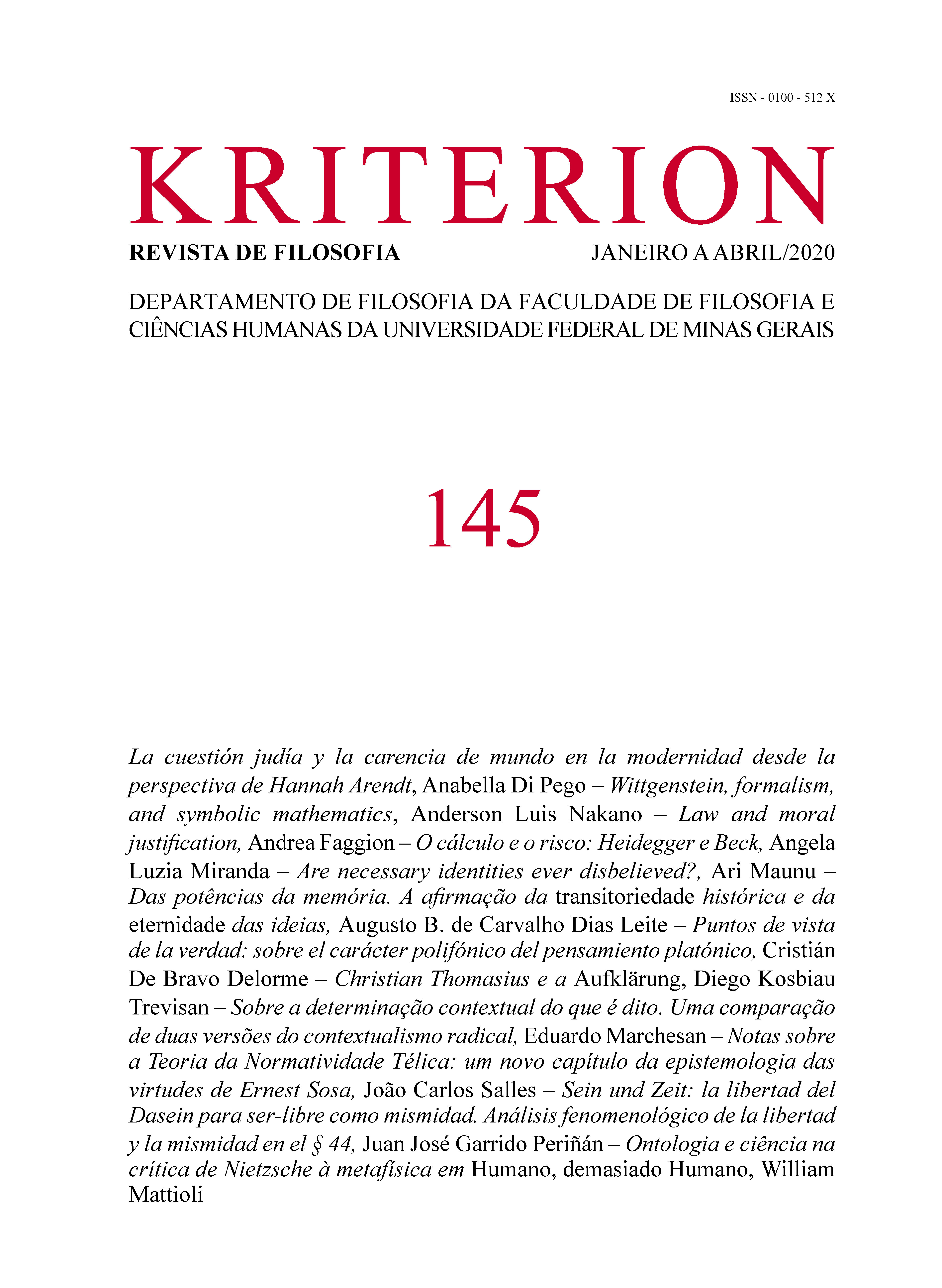LAW AND MORAL JUSTIFICATION
Palavras-chave:
law, justification, authority, justiceResumo
Many prominent legal philosophers believe that law makes some type of moral claim in virtue of its nature. Although the law is not an intelligent agent, the attribution of a claim to law does not need to be as mysterious as some theorists believe. It means that law-making and law-applying acts are intelligible only in the light of a certain presupposition, even if a lawmaker or a law-applier subjectively disbelieves the content of that presupposition. In this paper, I aim to clarify what type of moral claim would be suitable for law if law were to make a claim to be morally justified. I then argue that legal practice is perfectly intelligible without moral presuppositions – that is, that the law does not necessarily make moral claims
Referências
______. “On Necessary Relations between Law and Morality”. Ratio Juris, Vol. 2, Nr. 2, 1989.
______. “On the Thesis of a Necessary Connection between Law and Morality: Bulygin's Critique”. Ratio Juris, Vol. 13, Nr. 2, 2000.
______. “Thirteen Replies”. In: G. Pavlakos (ed.), 2007. pp. 333-366.
COLEMAN, J., SHAPIRO, S. (eds.). “The Oxford Handbook of Jurisprudence & Philosophy of Law”. Oxford: Oxford University Press, 2002.
COYLE, S., PAVLAKOS, G. (eds.). “Jurisprudence or Legal Science? A Debate about the Nature of Legal Theory”. Oxford: Hart Publishing, 2005.
GARDNER, J. “Law as a Leap of Faith: Essays on Law in General”. Oxford: Oxford University Press, 2012.
GEORGE, R. P. (ed.). “The Autonomy of Law: Essays on Legal Positivism”. Oxford: Oxford University Press, 1996.
GREEN, L. “Law and Obligations”. In: J. Coleman and S. Shapiro (eds.), 2002. pp. 514-547.
______. “Positivism and the Inseparability of Law and Morals”. New York University Law Review, New York, Vol. 83, 2008.
HART, H. L. A. “Essays on Bentham: Studies in Jurisprudence and Political Theory”. Oxford: Clarendon Press, 1982.
______. “The Concept of Law”. 2ª ed. Oxford: Oxford University Press, 1994.
HEIDEMANN, C. “Law’s Claim to Correctness”. In: S. Coyle and G. Pavlakos (eds.), 2005. pp. 127-146.
HOBBES, T. (1642). “On the Citizen”. Edited by Richard Tuck and Michael Silverthorne. Cambridge: Cambridge University Press, 1998.
HUME, D. “Political Essays”. Edited by Knud Haakonssen. Cambridge: Cambridge University Press, 1994.
______. (1741). “Of the First Principles of Government”. In: D. Hume, 1994. pp. 16-19.
KAVKA, G. “Hobbesian Moral and Political Theory”. Princeton: Princeton University Press, 1986.
KRAMER, M. “In Defense of Legal Positivism: Law without Trimmings”. Oxford: Oxford University Press, 1999.
LAGERSPETZ, E. “The Opposite Mirrors: An Essay on the Conventionalist Theory of Institutions”. London: Springer, 1995.
LADENSON, R. “In Defense of a Hobbesian Conception of Law”. In: J. Raz (ed.), 1990. pp. 32-55.
MACCORMICK, N. “Legal Reasoning and Legal Theory”. Oxford: Clarendon Press, 1978.
PAVLAKOS, G. (ed.). “Law, Rights and Discourse: The Legal Philosophy of Robert Alexy”. Oxford: Hart Publishing, 2007.
RAZ, J. (ed.). “Authority: Readings in Social and Political Theory”. New York: New York University Press, 1990.
______. “Between Authority and Interpretation: On the Theory of Law and Practical Reason”. Oxford: Oxford University Press, 2009.
______. “Hart on Moral Rights and Legal Duties”. Oxford Journal of Legal Studies, Oxford, Vol. 4, Nr. 1, 1984.
______. “The Morality of Freedom”. Oxford: Clarendon Press, 1986.
SCHAUER, F. “The Force of Law”. Cambridge, Mass.: Harvard University Press, 2015.
SOPER, P. “Law’s Normative Claims”. In: R. P. George (ed.), 1996. pp. 215-248.
______. “The Ethics of Deference: Learning from Law’s Morals”. Cambridge: Cambridge University Press, 2002.
WALDRON, J. “Law and Disagreement”. Oxford: Oxford Clarendon Press, 1999.
WOLFF, R. P. “In Defense of Anarchism”. 2ª ed. Los Angeles: University of California Press, 1998.










